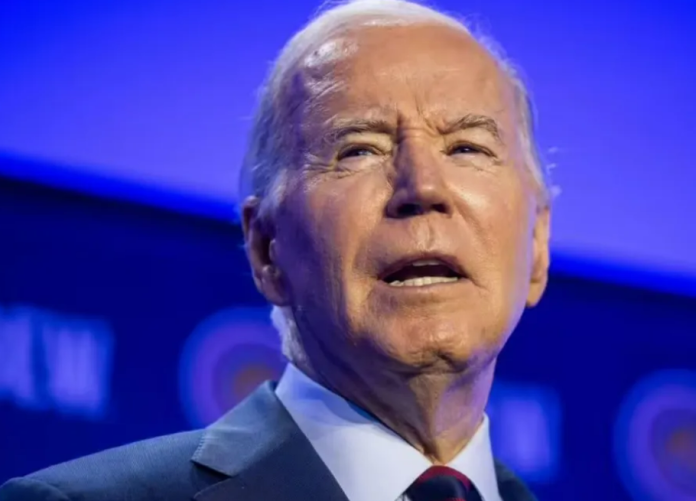In an exclusive report, Joe Biden’s administration is facing criticism for a surprising G7 statement that could have significant implications in the conflict involving the Houthis in the Red Sea.
The administration is being faulted for advocating a contentious statement at the G7 summit, potentially undermining efforts to combat the Houthi insurgents who are threatening to disrupt one of the world’s crucial maritime routes in the Red Sea.
Sources revealed to Express.co.uk that the US delegation, led by Secretary of State Antony Blinken, pushed for a statement condemning a memorandum of understanding (MoU) between Somaliland, a former British protectorate, and Ethiopia.
The US statement supported the claims of “failed state” Somalia over Somaliland, despite Somaliland’s established status as an independent democracy since 1991.
The strong language used in the G7 statement is a significant setback for Somaliland, especially after hints from UK Foreign Secretary Lord Cameron and Defense Secretary Grant Shapps that the UK might consider recognizing the African state, which holds immense strategic value at the entrance to the Red Sea with its key port of Berbera.
The statement was issued during a meeting of foreign ministers from the G7 major economies in Naples and has now apparently also implicated the UK, with reports suggesting that officials in the Foreign Office were hesitant to advocate for a new status for Somaliland.
The statement read: “We express our concerns regarding the Memorandum of Understanding between Ethiopia and the Somaliland region of Somalia, announced in January 2024.
We encourage both Ethiopia and the Federal Government of Somalia to maintain open channels of dialogue to prevent further escalation, working with regional partners within the framework of the African Union and through bilateral engagements, in accordance with international law and the principles of sovereignty and territorial integrity as outlined in the UN Charter.

Regarding the military actions against the Houthis in the Strait of Arden and the Red Sea, a well-informed source remarked, “This could have dire consequences moving forward.”
A source in Washington commented, “I’m hearing it’s due to US pressure. It appears they are unable to confront the Somalis effectively. A significant step backwards.”
Speculation is rife that the US’s stance on this matter stems from Barack Obama’s decision to support Somalia’s claims over Somaliland during his presidency, with Biden serving as Vice President at the time.

Furthermore, Democratic Congresswoman Ilhan Omar, of Somalian descent, recently asserted that she could prevent the Biden administration from acknowledging Somaliland.
The G7 statement comes on the heels of a recent visit by British Members of Parliament to Somaliland, where there was widespread support for the unrecognized country, lauded as “a beacon of democracy” in the region.
One of the MPs, Alexander Stafford, expressed his outrage at the G7 statement.
The Tory MP for Rother Valley stated, “This displays a reprehensible neo-colonial attitude from the G7. They should refrain from interfering in this matter. The decision of signing treaties should rest solely with the elected governments of Ethiopia and Somaliland.
Efforts to secure recognition for Somaliland in the UK have been spearheaded by former Defense Secretary Gavin Williamson.
In response to the G7 statement, Williamson remarked to Express.co.uk, “It highlights the detachment of the G7 from reality. Somalia is a failed state, with the government in Mogadishu supporting and endorsing terrorist organizations like Al Shabaab, which operate to undermine our interests.
“It is high time that the UK and US governments acknowledge the ground realities of politics and exhibit leadership instead of perpetuating failed policies of the past.”
Meanwhile, former US Ambassador Dr. J. Peter Pham drew a sharp contrast between Somalia and Somaliland.
He noted, “Officials have announced a November 13 date for one-person-one-vote polls in Somaliland, marking the 9th general election since its independence was reasserted in 1991. In contrast, the beleaguered residents of Somalia have been awaiting the privilege of casting a ballot since 1969.
Some individuals in Somaliland have found solace in the fact that the G7 statement did not outright condemn their cause. However, the government of Somalia has issued a statement welcoming the G7’s stance.

The international issues at play trace back to 1960.
Somaliland, initially a UK protectorate, attained full independence on June 26, 1960, becoming the 17th African nation to do so, but soon after united with Somalia. Following years of oppression and ethnic conflicts, Somaliland declared independence in 1991, adhering to its original British protectorate boundaries, yet it has not received official recognition for 33 years.
With its strategic port of Berbera on the Gulf of Arden, near the Red Sea, Somaliland holds immense significance in combating Houthi assaults on shipping in the world’s busiest trade route, drawing both the UK and US into action.
Ethiopia’s recognition of Somaliland was driven by its need for access to a major port, leading to significant diplomatic tensions with Somalia, which vehemently opposed the move.
However, Western nations had indicated that recognition of Somaliland hinged on African countries taking the lead, and there were hopes that Ethiopia’s decision would usher in a change in attitudes.
By David Maddox, Political Editor




























